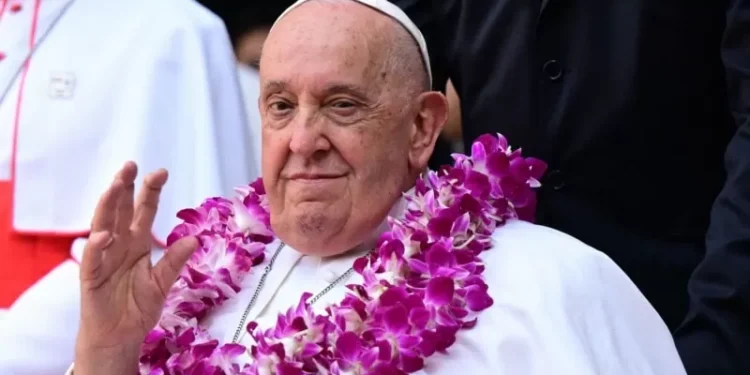Singapore – Pope Francis has just concluded his 12-day tour of the Asia-Pacific, defying health concerns to connect with believers from the jungles of Papua New Guinea to the skyscrapers of Singapore.
At 87 years old, the pontiff has completed his longest trip in duration and distance since becoming head of the world’s estimated 1.4 billion Roman Catholics over 13 years ago. Despite relying on a wheelchair due to knee pain and sciatica, and battling various health issues, Pope Francis remained determined to carry out his mission of spreading love, compassion, and unity.
During his four-nation tour, the pope showed occasional signs of fatigue, struggling to keep his eyes open during late-night liturgical readings and formal military parades. However, he was clearly energized by more informal interactions, playfully encouraging young people to join him in his calls to help those in need.
In his final inter-religious meeting with young Singaporeans, Pope Francis urged them to respect other beliefs, avoid becoming slaves to technology, and step out of their comfort zones. “Don’t let your stomach get fat, but let your head get fat,” he said, eliciting laughter from the audience. “A young person who is afraid and does not take risks is an old person.”
The historic tour, originally planned for 2020 but postponed due to the COVID-19 pandemic, covered a distance of 32,000 kilometers and involved 43 hours of flight time. Despite the demanding schedule, time differences, and hot weather, the pope did not have to reschedule any of his engagements.
Throughout his journey, which took him to the far corners of the Catholic Church’s world, Pope Francis delivered a powerful message to leaders to not forget the poor and marginalized. In Indonesia, the world’s most populous Muslim-majority state, he visited the Istiqlal Mosque to deliver a joint message against conflict and climate change.
In Papua New Guinea, where the heat was sweltering, the pope donned a bird of paradise headdress in a remote jungle village. There, he urged the inhabitants to put an end to violence and renounce “superstition and magic.” Addressing political and business leaders, he emphasized the need for the country’s vast natural resources to benefit the entire community, a call that resonates with many who feel their riches are being stolen or wasted.
In East Timor, a staunchly Roman Catholic nation, Pope Francis addressed nearly half of the population, drawing about 600,000 believers to a mass celebration on the island’s coast. He praised the country’s progress towards peace since gaining independence in 2002 but also called on leaders to do more to prevent abuse against young people, acknowledging the recent child abuse scandals within the Catholic Church.
In the affluent city-state of Singapore, the pope called for “special attention” to be given to protecting the dignity of migrant workers. “These workers contribute greatly to society and should be guaranteed a fair wage,” he said. With an estimated 170 million migrant workers around the world, mostly in the Americas, Europe, and Central Asia, Pope Francis’ words hold significant weight.
Despite the challenges and struggles faced by the pope during his tour, he was full of praise for the “entrepreneurial spirit” and dynamism of Singapore, a country that has built a “mass of ultra-modern skyscrapers that seem to rise from the sea.” Sandra Ross, a 55-year-old church administrator in Singapore, attended the mass led by Pope Francis and was deeply touched by his courage and dedication to his mission. “His spirit and enthusiasm are truly inspiring,” she said.
As Pope Francis returns to Rome, his message of love, compassion, and unity continues to resonate with people around the world. His determination to carry out his mission, despite his health challenges, serves as an inspiration to all. The pope’s visit to the Asia-Pacific has left a lasting impact, reminding us to always prioritize the well-being of others and to never forget the marginalized and vulnerable in our society.










